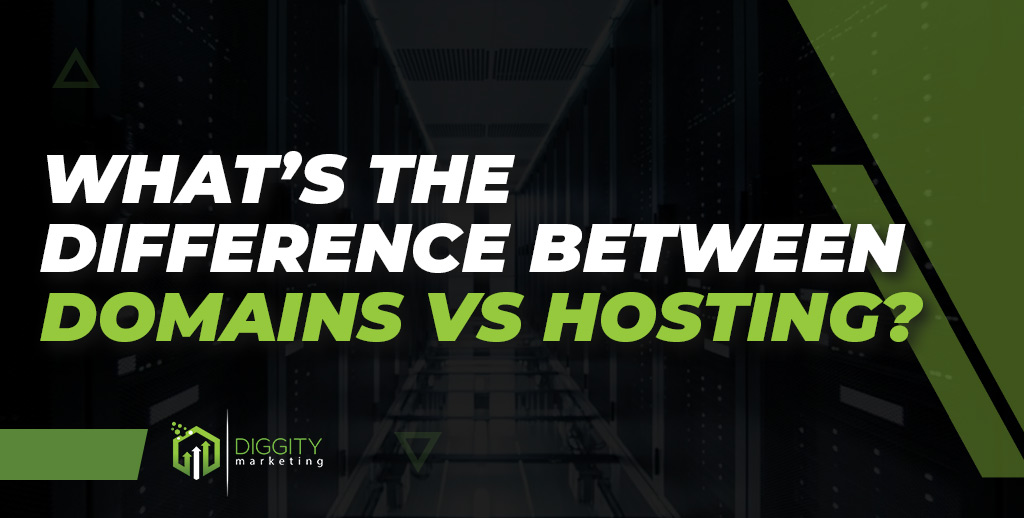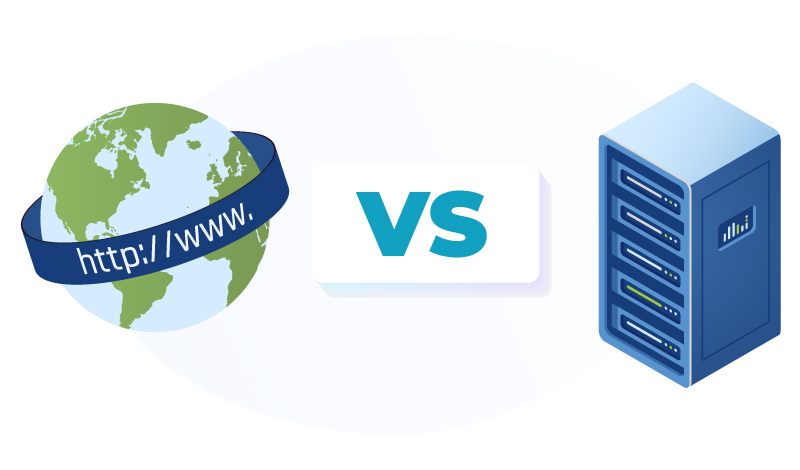As an experienced digital marketer, I understand the initial confusion newcomers may have when it comes to differentiating between domain names and web hosting.
A domain name is the web address of a website. For example, Google’s domain name is “google.com“.
Web hosting, on the other hand, is where your website’s files and data are stored so visitors can view your content.
In other words, a domain name is your website’s address while hosting is the land your website is built on.
In this blog post, we will explain the basics of both domain name and hosting. You will also discover the similarities, and how they work together to create a website, as well as the differences that set them apart.
Table Of Contents
- What Is A Domain Name?
- What Is Domain Registration?
- What Is Web Hosting?
- How Do Domain Names And Web Hosting Work Together To Create A Website?
- What Is The Best Way To Get Started?
- Frequently Asked Questions (FAQs)
- What Is The Difference Between Hosting And Domain?
- What’s The Difference Between A Domain Name And A Hosting Account?
- Should I Buy Domain And Hosting Together?
- Can I Use My Domain Name With Any Web Hosting Company?
- How Can I Host My Own Domain for Free?
- Does Google Offer Website Hosting?
- Can I Host A Website Without Domain Name?
- Ready To Set Up Your Website?
What Is A Domain Name?
A domain name is the web address of your website. It’s what people will type in to find your site, and it’s how you’ll be known online.
For example, our domain name is “diggitymarketing.com“, and anyone who types that into their browser will be taken to our website.
Domain names are usually made up of 2 main parts:
The “TLD” or “top-level domain”, which is the part that comes after the “dot”, like “.com” or “.net”.
The “SLD or “second-level domain”, which is everything that comes before the “dot”, like “youtube” in “youtube.com“.
Some important features of the domain names are:
They can be up to 253 characters long
There are over 280 domain name extensions to choose from
They can include letters, numbers, and hyphens.
They are not case sensitive, so “diggitymarketing.com” is the same as “DIGGITYMARKETING.COM”
Domain names must be unique, so no two websites can have the same domain name
How Do Domain Names Work
Computers don’t understand words, they only understand numbers.
So if you need to access a website, you have to tell the computer the numerical web address, or “IP address”, of that site. For example, the IP address for our website is 67.202.92.16.
As you can see, this is not a very user-friendly approach, which is why domain names were created.
Domain names act as an alias for an IP address, so you can use a word or phrase that is easy to remember instead of a string of random numbers.
So when you type a domain name into your browser, the DNS will look up the corresponding IP address and take you to the right website.
In other words, it translates the domain name into the IP address that the computer can understand.
What Is Domain Registration?
Domain registration is the process of acquiring a unique web address or domain name for your website.
As we previously mentioned, the DNS job is to match domain names to IP addresses.
Now, what would happen if the DNS found two IPs (websites) with the same domain name?
Exactly, it would get confused and wouldn’t be able to take you to the right website.
This is why the domain name must be registered so that there is only one IP (website) associated with each domain name.
Domain name registration is usually done through a “registrar”, which is an accredited company that has been approved by the Internet Corporation for Assigned Names and Numbers (ICANN).
They are responsible for maintaining the DNS, and they are the only ones who can register or transfer the domain name.
Types of Domain Names
Top-Level Domains: These are the most common types of domain names, and they include the “.com” and “.net”
Country Code Top Level Domains: These domains are used to indicate the country of origin of a website, and they include domains like “.us” (United States), “.ca” (Canada), and “.uk” (United Kingdom)
Generic Top-Level Domains: These are domains that are not associated with any specific country, and they include domains like “.biz” (business), “.info” (information), “.org” (organization), and “.edu” (education)
Second-Level Domains: These are domains that come before the “.com” or “.net”, and they can be anything you want as long as they are not already taken.
Third Level Domains: They are often referred to as “subdomains” and they are used to create a more specific web address for a certain section of your website. For example, if you have a blog on your website, you could create a subdomain called “blog.yourwebsite.com” or “news.yourwebsite.com”
How Much Does A Domain Name Cost?
Domain name registration usually costs around $10 per year, but the price can vary depending on the registrar, TLD, and SLD you choose.
For example, if you want to purchase the domain name “insurance.com” it will cost you around $35.6 million while a domain name like “mydomainnnn.com” will only cost you around $9 per year.
There are also some domain name registrars Freenom that offer free domain name.
What Is Web Hosting?
Web hosting is a service that allows you to store your website files and data on a server (powerful computer) so that it can be accessed by people from all over the world.
In other words, it is a way to make your website accessible to everyone.
How Does Web Hosting Work?
To understand how web hosting works, you first need to understand a little bit about the internet.
In very simple terms, the internet is a way for computers to connect with each other so that they can share data. This data can be a website, a picture, a video, or anything else.
Why is this helpful?
Well, without the internet, you would only be able to access data that is stored on your own computer or smartphone and that’s it.
For example, if you wrote an essay on your computer, the only way people can read it is either by physically being in front of your computer or by transferring the file to their own computer using a CD or a USB drive.
As you can see, this is not very practical for numerous reasons.
First of all, it would be very difficult to share data with people from all over the world.
And secondly, this is extremely inefficient disk space-wise because every person would need to store all the data on their own computer.
The internet solves both of these problems by allowing computers to share data with each other without having to physically transfer the files.
This way, you don’t have to worry about storing all the data on your own computer, and people from all over the world can access it as long as they have an internet connection.
Ok now we understand how the internet works, but what does it have to do with hosting?
Well, we mentioned that the internet only allows communication between computers, but it doesn’t actually store any data.
So if you want to create a website, you need to store your website files (code, text, images, etc) on a computer somewhere so that people can access it and read the files.
And that’s exactly what web host is!
This way, when people try to access your site, they are actually accessing the website files that are stored on the web server.
Why go with hosting if you can simply host your website on your own computer – you might ask.
The answer is simple: Reliability, security, and speed.
Types of Web Hosting Services
Shared Hosting: Shared hosting is the most popular and affordable type of hosting. As the name suggests, with hosting that is shared, your website will be sharing a server with other websites.
- This is a great option for small businesses and bloggers who are just starting out because it is very affordable
Dedicated Hosting: Dedicated hosting is the most powerful, yet the most expensive type of hosting.
- Unlike hosting that is shared where many websites share the same server, with dedicated hosting, you will have your own server all to yourself.
- This is ideal for large businesses and high-traffic websites that need the most power and flexibility
VPS Hosting: VPS hosting is a step up from shared hosting. With VPS, you will still be sharing a server with other websites. However, the server will be divided into virtual servers and each website will have its own dedicated resources (RAM, Disk Space, and CPU power) that no one else can use.
- In other words, it’s just like a dedicated server, but smaller and more affordable
Cloud Hosting: Cloud hosting is the newest and most popular type of hosting. With cloud hosting, your website will be hosted on a cluster of web servers (usually in different data centers around the world).
- This way, if one server goes down, your website will still be up and running because it will be served from another server in the cluster.
- Cloud hosting is also very scalable, so you can easily add more resources (CPU, RAM, and Disk Space) as your website grows
WordPress Hosting: WordPress hosting is a special type of hosting optimized specifically for WordPress websites. WordPress is a content management system (CMS) that allows you to make a website without having to write any code.
- Opting for a WordPress hosting provider is a great option for beginners because it is very easy to use and doesn’t require any technical knowledge
Email Hosting: Email hosting is a type of hosting that allows you to create and manage email accounts for your domain.
- This is a great option if you want to have a professional-looking email address (e.g. [email protected]) that is connected to your website
How Much Does Web Hosting Cost?
Web hosting costs vary depending on the type of hosting service and the configuration that you choose.
Below are examples of common hosting types along with their average monthly prices.
Shared Hosting: $3-$15/month
Dedicated Hosting: $100-$500/month
VPS Hosting: $20-$100/month
Cloud Hosting: $5-$300/month
WordPress Hosting: $3-$250/month
Email Hosting: $0-$10/month
How Do Domain Names And Web Hosting Work Together To Create A Website?
To better understand how domain names and hosting work together to create a website, think of your website as a house.
In this case, the plot of land that the house is built on is the web hosting server, the location/address of your house that let people know where to find your house is the domain name, and the roads connecting your house to the rest of the world are the internet.
What Is The Best Way To Get Started?
When it comes to domain names and hosting, you have 2 options:
1. Buying The Domain Name And Web Hosting Together
If you’re just starting out, the easiest and most convenient option is to buy the domain name and hosting together from the same provider.
This way, you only have to deal with one company and you don’t have to worry about transferring your domain name, changing your DNS settings, or doing anything else. It will all be taken care of for you.
The only downside to this option is that it is usually more expensive than buying the domain name and web hosting separately, as you could find a cheaper web hosting service provider than the one you bought your domain hosting from or the other way around.
However, some web hosting companies offer discounts when you buy them together, so it’s worth shopping around to find the best deal.
2. Buying The Domain Name And Web Hosting Separately
If you’re looking to save some money or if you already have a web hosting account that you’re happy with, then you can buy the domain name and web hosting separately.
In this case, you will need to buy the domain name from a domain registrar (such as GoDaddy, Namecheap, or Hover) and then set the DNS settings to point to your web hosting provider.
You will also need to change the nameservers at your account for web hosting to point to the domain name registrar.
Doing all of this can be a bit confusing and time-consuming, which is why we only recommend this option if you’re comfortable doing it yourself or have someone who can help you.
Frequently Asked Questions (FAQs)
What Is The Difference Between Hosting And Domain?
The difference between hosting and domain is that web hosting is the physical server where your website is stored, while the domain name is the address people use to access your website.
What’s The Difference Between A Domain Name And A Hosting Account?
The difference between a domain name and web hosting is that a domain name is the address people will use to access your website (e.g. example.com) while a web hosting account is the account provided to you by your web hosting company so you can manage and monitor your server (the computer that stores your website.)
Should I Buy Domain And Hosting Together?
You should buy a domain name and web hosting together as there are many web hosting companies that offer discounts when you do this.
Can I Use My Domain Name With Any Web Hosting Company?
Yes, you can use your domain name with any host, but you will need to change the DNS settings for your domain name to point to the new web hosting account.
How Can I Host My Own Domain for Free?
You can host your own free domain using a free web hosting provider. They aren’t very efficient, but they can work in a pinch.
However, we recommend using a paid web hosting company if you are serious about your website as they are more reliable and offer much better features.
Does Google Offer Website Hosting?
Yes, Google does offer website hosting. Google has a web hosting platform called Google Cloud where you can host your website. However, it’s not recommended for beginners as they have no support and can be quite confusing to use.
Can I Host A Website Without Domain Name?
You can’t host a website without a domain name. The domain name is what tells the web server where to find your website so people can access it.
Ready To Set Up Your Website?
That’s everything you need to know about domain vs hosting! If you’re just starting out, we recommend buying the domain name and web host from the same hosting company.
There are many amazing web hosting providers out there that offer great discounts when you buy them together.
If you’re just starting out and are looking for a good place to find a good domain and web hosting provider then you can read our article The 7 Best Web Hosting Providers for Beginners (2022).


 They can be up to
They can be up to












